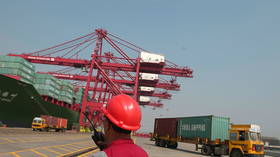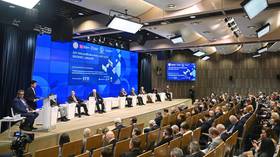Russia-India trade to reach $100 billion

Trade between India and Russia is expected to reach $100 billion by the end of the decade, Kommersant reported on Thursday, citing analysts from the Russian-Asian Business Council (RABC).
Russian exports to India are forecast to grow from $32.5 billion in 2022 to as much as $95 billion in 2030, while imports are predicted to surge from $2.5 billion to more than $20 billion over the same period.
Trade between the two countries was much less significant before 2022, although Western sanctions imposed on Russia over the Ukraine conflict have forced Moscow to redirect exports to Asia. Earlier this week, Russian Ambassador Denis Alipov stated, citing Indian government data, that the trade turnover between Russia and India reached $54.7 billion in the first ten months of 2023. Moscow has become one of New Delhi’s top four major trading partners, he added.
Russian export growth will largely be driven by energy resources, while the rise in imports from India will come from increased purchases of pharmaceutical and chemical products, according to experts.
India has become one of the largest buyers of Russian oil and coal since February 2022. RABC analysts expect demand for these commodities in the South Asian nation to increase further in years to come.
Russia is also expected to boost sales of fertilizers, machinery and equipment, wood produce, and base metals to India.
Meanwhile, Indian exports to Russia are forecast to see a major increase, as pharmaceutical companies as well as suppliers of chemical products and seafood expand their presence in the Russian market.
Analysts stressed that the current trade imbalance in favor of Russia is partially due to the withdrawal of some Indian corporate majors from the Russian market under the threat of US secondary sanctions.
The refusal of some parties to use the Indian rupee in trade settlements has also contributed to the imbalance, the RABC said. Russian banks have opened so-called vostro accounts in India in order to carry out commercial settlements in national currencies. The facility allows parties to conduct transactions in rupees and convert them into rubles.
However, the flow of rubles to authorized Indian lenders can only be ensured by local exporters, whose funds are often insufficient.
Experts noted that Russian investments in India are currently stagnant “against the backdrop of an increase in the volume of rupees in the accounts of leading Russian financial and energy companies.”
Where India Meets Russia – We are now on WhatsApp! Follow and share RT India in English and in Hindi













